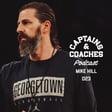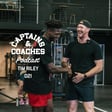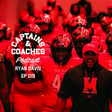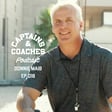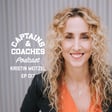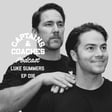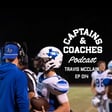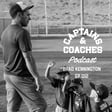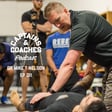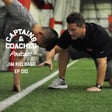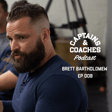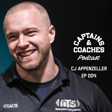Become a Creator today!Start creating today - Share your story with the world!
Start for free
00:00:00
00:00:01

006 - Weight Cutting & Combat Sports w/ Tyler Minton
Put on your sweats, grab a garbage bag, and join us as Tyler "Melee" Minton shares his journey from UFC fighter to top coach for combat athletes. We discuss the intense world of weight cutting, comparing cutting during a fight camp versus high school wrestling, and reveals the real battle: over-training vs. under-recovering.
This episode packs a punch with practical tips for fighters and coaches alike, for weight management, gain, or cutting under the clock. 💥
Training Programs:
Old Bull: https://bit.ly/old-bull-train
Captain's Speed, Strength, & Swagger: https://bit.ly/captains-train
#UFC #TylerMinton #WeightCutting #HighSchoolWrestling #Wrestling #OverTraining
Transcript
Introduction of Hosts
00:00:00
Speaker
action Welcome to the Captains and Coaches Podcast. My name is Tex McQuilken and I am joined by Tyler Maley-Mitten. Tyler is a former UFC fighter turned weight cutting coach for both some of the biggest names in the UFC and some awesome NFL players. He is the founder of Ethos Nutrition and the host of the Coming Soon Truth Serum Podcast.
Dangers and Management of Weight Cutting
00:00:25
Speaker
In this conversation we explore the dangers of weight class sports and how to effectively cut especially for high school athletes to make sure the wrestling teams are doing this properly to put their athletes in the best position to succeed and win once they hit their target goal. We also speak to his working with professional football players and the impact of a coach the responsibility that he has to these athletes to ensure they're able to perform once they do hit their weight goals. It's not just a matter of getting the athletes to a weight on the scale. It's how they perform once they get to that target weight.
00:01:06
Speaker
Tyler does an amazing job speaking to the responsibility that a coach has for not only an athlete's performance, but also their health.
Rhabdomyolysis Incident and Lessons
00:01:16
Speaker
Which leads me to news that keeps coming across my desk from Tufts University, a Division III school in Boston that is a perennial powerhouse when it comes to the sport of lacrosse.
00:01:28
Speaker
They have 50 guys on their squad and recently they had a volunteer captains practice, I'm using air quotes there, where 50 athletes participated, 12 out of the 50 got rhabdomaleosis from a 45 minute workout. Five of those athletes are still in the hospital at the time of this recording.
00:01:51
Speaker
This workout, one coach was there. He was present. He was a volunteer coach. He's a former athlete, graduate of the program. They also graduated from Bud's training for the Navy Seals, a program designed to weed you out mental toughness in a ton of volume. So he is a great athlete, playing at Tufts.
00:02:14
Speaker
Then turned Navy SEAL, Bud's training successfully. So he's a great athlete. He's mentally tough. And now he volunteers his time. The coaching staff allowed a former athlete to volunteer their time to put them through this. There's a lot that can go wrong, that did go wrong with this situation, this scenario. So what is tough to this individual?
00:02:36
Speaker
is extremely tough for the team. So he may have assumed, hey, this is going to be easy for them. Or he I'm not sure what he was thinking. were He went in with targeting, hey, we're going to target mental toughness for these this team, these individuals. He then applied on an amount of work that caused rhabdomaleosis in nearly 20%, 20%, not one athlete, 20% of the participants here.
Ensuring Athlete Safety and Performance
00:03:05
Speaker
If you don't know what a rhabdo is, basically your muscles break down, your body urinates them out of your body, and it could lead to kidney failure, seizures, and even death in extreme cases.
00:03:19
Speaker
Yeah, tease and peace, thoughts and prayers to the athletes going through that. But how this is broken down, you had 50 athletes and one coach. That scenario in itself is a recipe for disaster. Then you're applying a workout that the coach who's not a strength and conditioning professional is just a great athlete that's going to go on and join the Navy SEALs. He passed his buds training. So now he took what was easy for him and he's going to apply it to his athletes. No bueno. He can take that enthusiasm with an appropriate program and then encourage and push. But that's the importance of following a quality program, targeted volume, targeted intensity that leads to specific adaptations from those imposed stresses, those imposed demands.
00:04:13
Speaker
So I do want to call that out. Hopefully more comes to light from this scenario. So I do want to say to the coach, hey, I i was that same enthusiastic professional that did not know, that took on the responsibilities of strength and conditioning from my team.
00:04:29
Speaker
I injured an athlete, but then I took responsibility and I took that to heart and I found seasoned professionals and experts in the world of strength and conditioning and athletic performance, and I learned from them. So that was 2009, that occurred for me. So I've i've been there, man, and now it's it's ownership, it's responsibility, and seeing the damage that you did and then finding wherever it was in that workout,
00:04:58
Speaker
that was too much for them because 20% of people with the same injury, the same instance, that's far too met.
Captain's Speed, Strength, and Swagger Program
00:05:05
Speaker
If you're looking to learn how to program for athletes, well then I have a program for you where you can apply it. It's called Captain's Speed, Strength, and Swagger where we work on the athletic development and also cots confidence development.
00:05:20
Speaker
Every single day has a leadership script. So if an individual athlete is following it, they can start to personally develop and maybe take these scripts into their huddles so they can develop their voice or follow it and lead it as a team. I got a number of teams that are taking the training, applying it, and then the coach is helping to develop leadership through the scripts while there is a targeted volume and intensity for the team to develop athletically.
00:05:48
Speaker
Enough of my soapbox. If you want to check out that program, click the link in the show notes. Captains, speed, strength, and swagger.
Tyler's Personal Journey and Experiences
00:05:56
Speaker
All right, now let's hand it off to Tyler for another episode of the Captains and Coaches Podcast. Ready, ready.
00:06:15
Speaker
Welcome to another episode of the captains and coaches podcast coming to you live from my home. And im I'm welcoming guest Tyler Minton, longtime friend, pal. Welcome to the show. I'm glad to be here. It's my first time in this part of Texas, so it's cool to stay with a local and and get to see the cool parts and as well as downtown Austin. oh yeah It's a little different than I expected but from the rest of Texas, but I'm happy to be here and I'm glad to be talking with you. Yeah, man. the The hill country is something else. so
00:06:51
Speaker
Welcome. We're going to go to Salt Lake barbecue after the show. We're going to work up a little appetite. And the, I was excited for when you reached out and ah to get you on the show, cause there's so many different perspectives that you can share with the team. Cause you have been a professional athlete and now you're working with professional athletes.
00:07:13
Speaker
in a team setting, in individual, in fight, in professional football. So a lot of different avenues and aspects that we can learn from. So there's so much that we, we want to pull into your experience to, to, to share with our audience here. So I want to start with your professional career. I know you were a high school football player and then you stepped into the arena. So when did combat sports enter into your life? And then what was the, the, the guiding factor there to continue to pursue beyond just the high school? Yeah, to be honest,
00:07:51
Speaker
I wasn't, I wasn't a great football player. I worked hard. And if you talk to my coaches, I still see my old high school coaches. They talk about how and I just notice notably worked harder than a lot of the other kids. Uh, my, my coach actually told me this story. He remembers last week when I saw him, he was talking about how sometimes You know, games or Fridays, but sometimes he would come by Saturday to maybe like watch film or do something. And he would see me on the field carrying like slosh pops or sandbags or flipping tires. Cause I recognized early on that I just wasn't naturally good. And you can't, you know, if you're not an athlete at age 17, 16, 17, 18, you're not just going to wake up an athlete. It's not going to happen.
00:08:37
Speaker
But I can work harder. You know, I recognize that. So that was my only chance of getting better. So that's what I did. um So I was doing those things and I started wrestling later in school because honestly, I dealt with bullies. I got picked on quite a bit. I wasn't a fit kid either until wrestling and.
00:08:58
Speaker
something about wrestling just became addictive for me. And i've I've been kind of thinking about it more recently and realizing what that is. I was never really, I would get anxiety on a football team. So if I'm on the line, I played tight end defensive end, I would get anxiety about performance as it relates to everyone else on the team. I was so terrified of letting someone down. Like I was, I would get honestly anxiety if the ball was running my way. Cause my I don't want to miss a block.
00:09:25
Speaker
Um, you know, I can, there, there was just something about that defense. It didn't seem to be that way. I was like, you know, like I want to get a tackle, but I just got so much anxiety when it came to that, but something about wrestling. Just, I had more fun. I felt more aggressive. I felt more free. And I think it's just because I had less anxiety knowing that if I lost, I just lost. And if I won, I won. I just felt like no one else relied on me. And I think that freed me up.
00:09:55
Speaker
And then after high school, obviously I wasn't good enough to go to like college for football. I wasn't even good enough to go to college for wrestling. Like I talked to a few, but nothing that would have given me like a good enough scholarship to to make it worthwhile. But I needed something to scratch that itch. So I started, well, I was working out at a gym that had some wrestling mats and I saw some guys out of the corner of my doing what I thought was wrestling.
00:10:22
Speaker
So I asked if I could join in, uh, went in at that time. I thought they were just shooting takedowns. Is this the plot of flight cup? That's right. It's about what it sounds like. Yeah. Oh, I couldn't talk about it if it was. Uh, so why I remember, uh, I was like, yeah, they, they said, yeah, you can work in. I just pulled my stuff off and was ready to go.
00:10:42
Speaker
And I took a guy down and he just starts choking me with his legs. Like, what are you doing? Like, I thought they were wrestlers. He's like, it's called triangle choke. That's weird, but okay. Let's like, can you teach me that? And I just started kind of working with them and I was showing them some wrestling stuff. They were showing me some jiu-jitsu stuff.
00:11:00
Speaker
And they invited me to the MMA gym to come train, uh, train just as a way to kind of have something to do to scratch the itch of, of still like wanting to wrestle. Yeah. And within I guess two months of training, they asked if I wanted to fight. Sure. I never intended to, but I'll try.
00:11:18
Speaker
Uh, I went fought, won my first fight in 12 seconds. So I didn't feel like that really scratched the itch. Where where were you living in? Uh, I was living in Johnson city, Tennessee. It was illegal in Tennessee. So we have to go to these like national guard armories in Kentucky. My first like three or four fights were in national guard armories in Kentucky.
00:11:37
Speaker
Yes, you can imagine and back then well how far does the sport come right? yeah Oh, yeah, and back then you would literally you would just go away and they would just find someone else who weighed around the same and You wouldn't even know you wouldn't get their name. You'd have no idea who you were gonna fight Yeah, and then you would weigh in and then you would fight a couple hours later And it was wild times. I'm not knowing anything about him. No, nothing I mean you you just hoped it wasn't a promoters buddy and this guy wasn't like 20 and 0 but you had no idea So I go in there and I just remember me and this guy, like he signals to touch hands and I go to touch hands and as soon as I go to touch hands, he just shoots in on me.
00:12:16
Speaker
And he did that and I grabbed a guillotine and sprawled at the same time. And when I did it, like knocked him out. So I'm like, okay, I win. Um, but it just didn't, that didn't really scratch the edge because it felt like nothing happened. And then, uh, and this gave you football, gave you more anxiety than this month. Yes. Yes. Something about what it just never did. And then my second fight, I decided I would fight again. I won in like 30 or 40 seconds with with a triangle choke. Remember I.
00:12:43
Speaker
Got the guy, triangle choked me, picked me up and slammed me, but I held on and then he picked me up again and fell asleep. And then my third fight, I got a concussion in round one. I gave my guy a concussion in round two. Neither of us remember round three and we just slugged.
00:13:00
Speaker
and just blood everywhere, just sloppy. And it was something about after that fight, ah when I watched it, because I don't remember much about it, I was like, yeah, I love this. And and the rest is history. It became something that i everything I did was to become a full-time fighter. And yeah, and I don't even know what it was, the psychology behind it, but something about fighting I just loved.
00:13:24
Speaker
Yeah. And then now you're working specifically with a lot of nutrition and weight management for these professionals, which in the world of fighting, that's, that's everything you miss yeah and your, your payday is gone. Yeah. And then now some, some awesome NFL dudes, which is cool. So then like speak to the connection, why you became connected to weight management.
First Weight Cut Experience
00:13:48
Speaker
Was that due to your career?
00:13:50
Speaker
Yeah. So that first fight, like I said, it was same day weigh ins and I, even as a wrestler, I didn't really cut weight. Like I was a smart guy for the weight class because I just took advantage of being the smart guy. I didn't have to cut weight, but they told me, cause again, this is coaches, especially then early, you know, or I guess 2009. Yeah. 2009 coaches then knew nothing about weight cutting. They most still don't. But they're like, yeah, you, you, how much do you weigh? And honestly, I didn't know. I was like, I put like one 90, we'll call you'll be a one 70. Okay. Like, I don't know what that means. You know, like how the hell I'm supposed to get there. And the fight was going to be in like a month and I was actually 200 pounds. I just assumed I was one 90. I didn't realize I'd gotten up to 200. Cause I didn't, I didn't weigh. I didn't check myself. I wasn't a, it's a lot of people. Yeah. I wasn't expecting to be anything, you know, and.
00:14:42
Speaker
And here I was 200 pounds, but I agreed to this fight at one 70. I'm like, okay, I'm going to, yeah, I'm not going to tell them I'm going to do it. And I remember I was able to diet down to one 90, but then I'm one 90 on like Monday weigh ins or Saturday.
00:14:59
Speaker
So I cut from 190 to 170, just awful. I just starved. I didn't eat. There was three days. I didn't eat. I quit drinking water for literally two days, which is just, you're on the verge of death. yeah Um, you weigh in and then you have just a few hours to fight. And so what I didn't tell you, cause I was going to bring it up and it is the perfect question for this. After I win, they raise my hand and my knees buckle cause I'm so weak. I have nothing.
00:15:26
Speaker
My, but I made way, you know, what's, you know, so I was, I just knew that I, okay, I need to do something different. So by the second fight, I at least knew I needed to walk water. yeah I was walking about 190 pounds. Then I just lost weight and then, but.
00:15:42
Speaker
Still, so then I go to cut from one, I guess I lost down to about 185 during the few week camp. So then I had to cut from like 185 to 170 and it was no easier whatsoever. Like it might've even been harder. Like it just no difference. And then I just noticed that.
00:16:00
Speaker
I was able to make weight, like I would be walking lighter and I could still make weight, but like it just can't, it shouldn't suck this bad. And everyone just kept saying, oh, it's just part of it. And I mean, you would lose sleep the night before. Cause you're like in a sauna all night. And um I knew enough about the human body. of I was always like a science guy and anatomy and physiology guys. And I'm like, man, it can't be good to be missing a night of sleep to make weight that you're not having time to recover for.
00:16:30
Speaker
Then I guess it was by my third or fourth thought. I don't remember they had 24 hour weigh ins. So you at least had that. Yeah. So then, you know, you don't, you know, you still have the the horrible weight cup, but you don't, you know, you don't really know what to do to rehydrate to get back up. So then it's just, you eat whatever, everything you can, because that's just a normal thought process and it's still a pretty normal thought process. And it wasn't until, I guess,
00:16:58
Speaker
towards the start of my professional career, I had a weight cut that I got so sick during. I just, I mean, I thought I was going to die. I remember telling my friend, like, I think I might die. can you And yeah you were that your own coach at this point?
Learning and Mentorship with Rob Wolf
00:17:15
Speaker
Yeah. No one at this point, no one knew anything. Like Mike Dolce was kind of like the first one to make a business of weight cutting. And he wasn't really widely known. You know, like, like,
00:17:25
Speaker
You didn't really know his methods. He just worked with some UFC guys. Right. And so i mean that that's the same for a lot of practices yeah where a ah coach hops on the coattails of a successful athlete and then he gets opportunities because of that athlete's success. And a lot of reason they succeed in spite of the training that coach provides. Yeah. Yeah. And it was, it was one of these things. I just knew something wasn't right. And I, I,
00:17:54
Speaker
After that weight cut where I really felt like I was going to die and then I still had, you know, I made weight and I fought like something's got to give. So I decided I was going to change my degree. I was going to school. I was pre chiropractic, but I didn't really want to be a chiropractor.
00:18:08
Speaker
I just didn't know why I wanted to make money and I wanted to do something in in that realm, in the sports. So you're used to manipulating. Yeah. It makes sense. is it And so I'm like, I'm going to switch to nutrition. So I switched to nutrition thinking that was going to give me the answers and it doesn't. no That gave me the answers to dealing with a sick population. So it was after some time of, of fighting and nutrition, I reached out to Rob Wolf who I'd met at a CrossFit nutrition seminar.
00:18:37
Speaker
And I sought his help and he resisted for a long time. He didn't want to help me. And he'll say it's because he has a saying, no good deed goes unpunished. And he said anytime he had tried to like mentor people in the past, it bit him in the butt. So, but I kept on and I annoyed him until he figured, well, I'll at least give it a shot. So he'll shut up. And I took everything he said to heart and he was talking more on the lines of recovery than he was nutrition.
00:19:06
Speaker
um So I started really diving into the importance of sleep recovery. And then I started doing my own research on electrolytes and, you know, antidiuretic hormones and all these things that make you sweat or make you hold sweat.
00:19:20
Speaker
And I started then looking more into what I could find on what like Mike Dolce was doing. And I just started kind of putting together my own thought processes and my own you know ideas of weight cutting as it relates to anatomy and physiology.
00:19:36
Speaker
And, you know, pretty soon my weight cuts were easy.
Developing Effective Weight Cutting Methods
00:19:40
Speaker
I was doing like Facebook videos of me in a sauna eating, like eating M&Ms and stuff while I'm like cutting, you know, the person would be like, how much weight are you cutting? I'm like, I have like 15 pounds. Like, oh how long is that going to take? And I knew the process I i developed. I've been practicing it like 15 pounds. I'll make it in like three to four hours.
00:20:01
Speaker
like while I'm eating peanut M&Ms and stuff. And I just kind of got known for making really big wake cuts easy myself. So then people started asking for help, started helping some friends. Some of those friends got to the UFC. I was just helping them for free because they were my friends. And I remember to this day when like a top UFC athletes called me and asked how much it would cost to hire me.
00:20:28
Speaker
I was like, well, you know, I'll have to draw up a business, you know, I'll draw up a proposition for you and I'll let you know. Can you give me 24 hours? Yeah. I hung up the phone. Like I better create a business plan because this isn't a business. I don't charge anything. Like I had, and it wasn't a business. It was just something I did for fun and for free for friends to help them. And I happened to be good at it. Yeah. So I made it a business. He had a great weight cut and within ah one year I was working with three UFC champions and all three of them kind of came out publicly saying it was the best way cut of their life.
00:20:59
Speaker
so you know So let's speak to that process. when When do you get tapped in to start the cut? Is it six weeks? Is it eight weeks? How long is a normal camp and a cut involved in that? the pins on the It depends on the fight. usually Usually a camp is anywhere from six to eight weeks. Even if a fighter gets notified in 12 weeks, they don't want to start until six to eight weeks.
00:21:25
Speaker
Sometimes it can be a short notice one, but, but six to eight is your general timeframe. The problem is fighters don't believe in what would be called a 52 week fight camp. And that means you're prepared year round to where then you don't have to make extreme changes. right What most people don't realize most fighters, even at the highest level, when they're not in camp, they're not doing anything.
00:21:52
Speaker
that looks, they might go trained, but their diet's not remotely healthy. They're not, they're not, they're not worried about their weight. And in fact, one problem is if you take a fighter and you help them make weight really easy, they just get more confident they can be heavier the next time and that becomes a problem. So.
00:22:10
Speaker
Periodization is not a real thing with most fighters and that becomes a problem. So it really just it really just depends and you just have to ah to to update based off of who you've got and what you've got. And I will say now that I kind of, I don't want to say I'm on my way out the door with fighting, but I priced myself out of working with a lot of fighters simply because I have a wife and kids like I can't, you know, I can't work for the small amount of money to go
Challenges Balancing Family and Career
00:22:39
Speaker
live with people. Like I used to, I used to go live six, eight weeks at a time with athletes and cook their food that way. I knew what it was and then do everything very concierge and I
00:22:50
Speaker
I couldn't do that anymore. So I passed myself out of a lot. And then the UFC PI came in and they offer free services for people. So then it became a lot of people in my position started getting upset and nervous. Well, the PI is going to push us out. ah They aren't like, they're still going to be people who want the concierge service. And sure enough, they did. And that was fine. So it allowed me to.
00:23:12
Speaker
increase my rates work with far fewer athletes. I got to be more picky about the athletes and therefore I'm going to pick the athletes who treat this like a profession and they live the life year round. So that made that that far easier. Yeah. And then how, how involved with you were like the training. Did you partake in the training with them? Did you observe the training? Cause a lot of strength coaches.
00:23:37
Speaker
like are tasked with observing practice. So then you can manage all the stuff that you do in the weight room based off of what, how intense practices. Yeah. Like I said earlier, when it came to football, like I was never naturally good, but I was always knew that hard work would make me better. And one thing about me is I'm i'm tough. Like anyone who goes back and watches old thoughts, they're never like, dude, Todd was a really good fighter. They're like, holy smokes. He was tough. And I would beat a lot of guys just because I was tougher. my my My toughness was greater than their conditioning and they would get tired and then I got better. yeah So a lot of the fighters I would be working with would recognize that in themselves and well I was a professional fighter. So I would end up, it wasn't supposed to be, but I would end up becoming a training partner. And I remember at the time, Daniel Cormier preparing for Jon Jones and Daniel Cormier is a lot heavyweight and I'm a welterweight.
00:24:31
Speaker
But for our listeners, how much is a welter weight? A welter weight is 170 pounds, which means at the time I was walking between 190 and 200 pounds. I wasn't in any kind of camp of my own. And then how much was DC? At that time, probably in two thirties and DC. You're doing math in my head. Oh yeah. Oh yeah. And I'm, you know, I'm not a UFC, I'm not at his level, but DC is known for hurting training partners because he it's the AKA way they just train really hard. That being said, DC knows that he is a tough training partner, so he he he pays his training partner as well. like He makes sure that they you know he appreciates them.
00:25:12
Speaker
But he was breaking a lot of them, like mentally and physically just breaking training partners. So I remember at that point, my only job in camp, like I'm holding the water in between rounds. I'm giving him his water, which was water and electrolytes and dextrose and things.
00:25:30
Speaker
But like I just started noticing and I offered, I was like, Hey, if you ever want me to spar, I can spar. And I remember he just, he kind of laughed. It's like, Oh yeah. Okay. Well, it just kind of stick to the stick to the kitchen. You know, it's like, okay. But then I started noticing that guys just started getting really hesitant to go in more than a few weeks of training camp. You know, it's like, all right, it's year round. They're over there like fiddle and putting their gloves on really slow and doing all this stuff.
00:25:56
Speaker
Like, okay, I'm going to like, I'm going to offer again. Still just kind of laughed. Well, then he gets a guy. I don't remember if he hits him, kicks and whatever, but the guy's like done. He goes out and they need someone and and no one's volunteering to go in. And these guys, it's their job. Like yeah you're a training partner, but they're either hurt or they're, they're just barely wanting to go in. I'm like, I'm going. And so I just go glove up. And I remember they look at me and like, are you, are you sure? I was like, yeah, I'm thinking, no, but we know what's the worst they can do. Chances are you're not going to kill me. People don't really die from m MMA injuries.
00:26:31
Speaker
Uh, the worst you can do is knock me out and I've never been knocked out. So I don't think you're going to do that. So all this is going to do is hurt for five minutes. I can deal with hurt. So I went in there and yeah I hurt for five minutes, but.
00:26:46
Speaker
out of all these guys that were far better than me, the one thing I probably did better than them as I just kept coming. Yeah. Like he's hitting me, kicking me, ty taking me down. I just keep buzzing forward. Cause I know that I, the only way I can help him get better is to go as hard as I possibly can and to keep giving him a body. Yeah. Even though I'm just a ah dummy at that point, but I wanted to help make him better. And after that I became just a ah training partner as well.
00:27:14
Speaker
That's awesome. Yeah.
Common Mistakes in High School Wrestling Training
00:27:16
Speaker
I mean, it's, it's why snore now cause he broke my nose, but you know, less, you know, for the story, some things, some things you have to do just for a cool story. to tell Well, and there you go. Yeah. It's like the, the practice squad freaking Rudy Rudiger just yeah throwing his body around for the, the, the glory of the team. That's awesome. The, uh, what I want to spend a lot of time with is, is high school wrestling and those practices, right? It's not a,
00:27:41
Speaker
a six, eight week camp to cut for, it's a season. yeah So where are those coaches messing it up that you're aware of that we can aim to educate and change those practices? Yeah, I'm very familiar with that. And and fortunately more coaches are trying to fix that. Like I consult with the Indiana University's wrestling team. ah They brought me out last year. I'll be going back this year so and remotely I work with them because they recognize that there is a huge gap and they want to bring in people are yeah experts yeah who can fix it. And the biggest issue is, again, out of season, there's not really any attention to weight. These guys aren't really doing anything like that. So in season, it's just a season long weight cut.
00:28:28
Speaker
And what happens with that again, the body does not care about performance. The body doesn't care about aesthetics. It doesn't care if you have a six pack. It doesn't care if you win a match, it cares about survival.
00:28:40
Speaker
And the more you put it in survival mode, the less it's going to give you for performance and the less it's going to give you for aesthetics. And that's why you tend to see wrestlers start missing weight later in the season that didn't early in the season. Fighters will start missing weight later in their career than they did earlier in their career.
00:28:59
Speaker
And that's because they put themselves in these position where they have these horribly hard weight cuts and they might make it, but especially with wrestling, well, then you're wrestling again the next week. And what happens is they starve themselves. They, a lot of times they weigh under drink water because that just makes sense in the head. I need to lose water weight. So I'm going to drink less water, but then I'm going to sweat. Well, the body says, okay, cool. Well, you're putting me in that position. We're not going to sweat, but you keep forcing it. Yeah. So it'll, you know, you'll squeeze it out eventually.
00:29:29
Speaker
But then what do they do? They win and all weekend long, they just eat whatever they want because they know come Monday, they're back to starving and sweating. And they just repeat that cycle season, season around, um, you know, all season and they're just, they're just worn out. I mean, everybody can think of the high school kid.
00:29:48
Speaker
high school wrestler they went through that was sneaking plastics on under their outfit oh yeah wearing to sweat. And as you're saying this, I'm remembering buddy nom who just and never shut up, but he was jacked. I don't know how he did. I never went to a match, but then running the track in a sweatsuit wrapped in a plastic bag. And I'm sure he had a plastic bag underneath the sweat.
00:30:07
Speaker
Yeah. Yeah. And that's just, that's, oh Oh gosh. I just think of, think of those, those times and that's just normal. So what I try to help with, especially with wrestlers, like, Hey, like first off, be a professional. You chose to do this. You have to accept the fact that's big for a high schooler. Yes. Yes. And it's like, you have to understand you don't have to wrestle. You can do anything else.
00:30:29
Speaker
You know, like I like to joke with them sometimes and and just, cause I do, I consult some high schoolers as well and joke around with them as like, Hey, you can go play baseball or something easy. You know, you just say that cause you, you, you appeal to that or mentality or go play basketball there in wrestling season. You know, it's a lot easier than what you're doing. You might as well, you don't have to go away. You know, the girls will actually be there to watch and like, but you chose to wrestle. So if you're going to choose a wrestle, choose to do it right.
00:30:55
Speaker
And get them in that mental position to to understand that this is a choice and they can, they can, they can tap out at any moment. But since you chose it, let's do it the right way. And I'm, you know, I'll tell them to, and I assume you want to be good at this and I assume you'd like to go to college for this. So if I'm making those assumptions, I should be able to assume that you're willing to make other sacrifices to do those things. And once we get them to understand that we first have to look at, are you even in the right weight class for you?
00:31:24
Speaker
And sometimes people aren't, but most times it it is. that you're like like they're They're in an okay weight class, especially by the time you get to high school. The problem is they're not willing to make the lifestyle changes and sacrifices they need for that.
00:31:39
Speaker
And listen, I get it. Like you're a high schooler. Like that's not, it's the last thing on your mind, but again, you chose it. And wrestling is not for the faint of heart. It's in a lot of ways, I'll argue it's the hardest sport because I'm i'm biased, but it asks things of you that no other sport asks. None of the other sports in high school.
00:31:59
Speaker
you have to make weight none of the other sports in high school you you're a literally physically beating someone to to beat them yeah like that's how you win there's a point system based off of how much you are physically man handling this other human after you just cut weight yeah nothing else asked that of you So we have to make those lifestyle changes again, or change your
Weight Management in Wrestling Season
00:32:20
Speaker
sport. And that becomes number one, like in the off season, you don't have to be training like crazy. You don't have to restrictively diet. You don't have to be in a calorie deficit year round. In fact, you shouldn't be. You just have to not get heavy in ah in in the off season. Just be at a moderate weight within striking zone of your weight class. And then in the pre-season, we can focus on getting a little bit lighter.
00:32:45
Speaker
and establish that new maintenance baseline. So then our weight cuts are purely cutting things that that that are passive, passive weight loss. We can lower our fiber, fiber holds gut content. We can lower our fiber in the last few days to remove some gut content. We can lower our water in the last 24 hours to remove some of that water.
00:33:10
Speaker
you know We can cut a couple days worth of carbs to to lose the water that's attached to the glycogen that we consume, that we get when we consume carbs. But we don't have to then do all the crazy work in the sauna suits and and and all of that. Because if you're forced to lose mass, you can't you can't gain mass in the season. You're not going to gain body mass or lean muscle mass during the season. and But what we're doing is we're losing we're losing that. So by the end of season, guys will actually have higher body fat percentage and less lean body mass than they did at the beginning of season. But if we lose some of the the the water that was attached to our muscles and in the gut content,
00:33:53
Speaker
We can get most of that back during the way the, the rehydration phase. So we only want to lose what we can actually put back on. yeah If we just keep repeating that cycle, we can recover. That that's a key phrase. Yeah. I definitely want to highlight. You only want to lose what you can put back on.
Dietary Advice for High School Wrestlers
00:34:10
Speaker
So if, if you were speaking to a high school right now and then three things within a kid's control,
00:34:17
Speaker
What would it be and more fiber? What would be like a simple high school direction as eat this? Cause they don't know what the hell fiber is, right? So that's an example. Yeah. Your, your, your vegetables, your whole grains, the things that are good for you. I mean, the things you should eat, you know, whole grains, like fruits, vegetables, these things are what you should do. But let's say you're, you're weighing in, um I'll say sat Saturday or those things Monday through, they should be part of your normal diet.
00:34:44
Speaker
from Saturday night till say Wednesday, those are those are the bulk of your carbohydrates. And then... say around Thursday, we'll switch, we'll lower the carbs a bit, and then we'll switch to low fiber carbohydrates, ex example like white bread. Again, it sounds counterproductive, um but white bread, people really like those stinger waffles before working out, it's those little waffles and high calorie, things like that, but white bread and honey, like ah a little sandwich, white bread and honey, do that before you go train. That's a good one. Yeah, exactly, exactly.
00:35:19
Speaker
um you know and and And those type of things that will give you the carbohydrates, they'll give you the quick energy, but they're they're a lower end fiber. Plenty of lean protein, be consuming that still on the samples every few hours. Yeah. I got a turkey. So turkey, chicken, steak.
00:35:35
Speaker
You know, like, like lean ground beef, 93 seven ground beef eggs. These things are, are still lean proteins. They're okay. And be consuming those like every, every chance you can breakfast, lunch, dinner, you know, pre-training snack. And.
00:35:52
Speaker
Water intake needs to remain adequate. Like you still need to be consuming enough water. Um, sometimes we'll water load that just, that's really just athlete dependent. That's where you raise your water beyond what you would normally increase. You still have to be careful with that though, because too much can put you in a hyponutremic state, which means you're increasing the water volume and it's decreasing the volume of sodium and electrolytes in your, in your blood.
00:36:20
Speaker
Yeah, I had it. I had that in college. You experienced that drank way too much water. Did you get the dizziness? Did you, did you see things or just the dizziness or what did you, what part did you hit? Yeah, seeing things just way too focused and it was a road game, but then leaving my college house, we had this porch out front, just all the water's gone. So then went to the athletic trainer and it's like, dude, I can't drink any more water. My body won't let me. So then it was like orange tangerines fruit, just to try to get something. Good thing we did that. Yeah. and so It's, ah it's, it's, I've seen a lot of coaches like Ford, like cause happened to train me.
00:36:57
Speaker
And it is, it's awful because what a lot of people don't realize you drink water, you sweat water with electrolytes attached to it. So like as we're sweating out electrolytes, we're not really replenishing those, then it's a problem. So I'm also big on that, like during the practices and even like in the morning and stuff, kids need electrolytes. Like you need to be drinking those because you're going to be sweating those out. Unfortunately, the last couple of days we can't be putting those in for water only. So this one's for parents, Gatorade before games.
00:37:27
Speaker
or competition. Yeah. Yeah. And, and I'm, I am like, I have supplements that I prefer, you know, like there's a, like I'm a big fan that it's a company called protect. They have a company, a product called hydrate. That is it's electrolyte packets. And I like those, but the fact of the matter is if someone's not investing in something, like they don't want to get the supplements, man. A lot of parents aren't comfortable with supplements or kids are kind of on their own. A lot of times so Gatorade has been around for a long time.
00:37:55
Speaker
And it's important to understand that Gatorade is a sports supplement. It was never a drink. Like I promise the guy who created Gatorade at the University of Florida, if he thought that there would be four-year-olds walking around drinking Gatorade, he would have never created it. yeah you know I remember the commercial. ah That's why we called it Gatorade. It's like an accent.
00:38:13
Speaker
but Yeah, it' ah it is a sport supplement. It is made to replenish those electrolytes. And I think it's a very good it's a very good thing for kids to be taking into their wrestling
Risks of Overtraining and Overheating
00:38:23
Speaker
practices. In line with high school and then now your experience with college athletics and professional, there's something I want to get into is is overtraining or overheating signs.
00:38:34
Speaker
Because this is happens far too often where we get an overheat or an under-hydrated or an over-training death within college athletics and high school athletics and even some pro cases. yeah and and you know yeah I don't know if you've heard it, but I i mean, I've said it and it's it's true to an extent. so you know renege on it a bit, but we say like there's no such thing as over-training, it's under recovery. And that's true to an extent, but especially in sports like wrestling and and fighting where you have weight cuts, it's like you're essentially always under recovering.
00:39:11
Speaker
because you lose weight by calorie deficit. That means you're consuming less calories than you burn. The more technical name for a calorie deficit is an energy deficit. And what that means is energy maintenance, which is just eating enough calories to maintain weight. You are effectively eating energy because calories are just a unit of measurement of energy. You're eating energy equal to energy that you're expending, that you're spreading or spending. Right. So if I'm in an energy deficit, that's literally eating less energy than you need to perform the tasks you're asking your body to perform. So I'm doing this and then simultaneously I'm increasing the demand for energy that my body needs to perform the task because now I'm running more and I'm doing these things.
00:39:59
Speaker
And again, the body chooses survival. So what happens is the body, you know, it's kind an aha, gotcha moment. The body's like, okay, cool. Well, if we're not getting enough energy to survive, I'm just going to lower the mechanisms. I need to survive. I'm going to lower our, we're going to lower our metabolism. We're going to lower the amount of calories we burn through, you know, non-exercise activity, activity thermogenesis.
00:40:21
Speaker
Um, and you're just in this feedback cycle, you feed yourself less, you burn less. And that's why people end up getting to the point where they're starving and they're still not losing weight because their body is burning less calories. And that's where you start to see athletes struggle the most. They're just putting so much effort in and they start dieting so extreme that the body starts to shut down. so And it's scary. I mean, it is a, yeah it is, if you've been been in one of those weight cuts or seen an athlete, especially in a hot place, it's, it's.
00:40:51
Speaker
scary to for them to know like how close they actually are to death. Yeah. For hopefully someone steps in and fix it. Hopefully yeah not obsessed over the the number versus yes the the person there. So then with the, the football side of things, do you feel it's just such a shock change of, cause it's mostly return to play off season summer workouts. They just didn't treat their bodies too well when they had off. And now we're just,
00:41:19
Speaker
We're shocked, especially at the high school level. yeah And a lot of that is that. it's it's you know they're Maybe they don't play another sport, or maybe they do, but even if, again, I'm not trying to compare the hierarchy of of sports, I definitely have my my biases and my favorites, but the fact is, football is harder than other sports, like it's going to be. um you know I would put it up there, like football and wrestling are more energy demanding sports than a lot of them. and They're also high risk of traumatic brain injury. You're likely sweating more because you're out in the heat, you're training with gear on. So all these factors come into play,
00:41:55
Speaker
And you talk about acclimation and they've, they've had from the end of season, the previous season, all the way up until the start of next season, they've not really acclimated to that. Then all of a sudden they jump right in and no high school coach believes, well, I'm not saying no, but most high school coaches are like, Hey guys, like I know, I know that we've, you know, we've taken off the last little bit. We're just going to start really easy into summer training. That's not a thing coaches do.
00:42:24
Speaker
It's like, okay, let's go. you You know, you had, you had all season off. We're going to hit this hard. And again, they're not acclimated to the heat. They've been maybe eating horribly. Um, you know, hormones are going crazy. So they're, you know, so they're sweating more than normal and all these things just result in the body being shocked by all of a sudden the demands that it's not had to see in some.
00:42:47
Speaker
Yeah, at the, I can speak to to the high school level. So the, when I was in high school, we had a rule change to where in the summer, my high school brought professional strength and conditioning coaches in. So they were in, they had professional athletes and this is in Houston area. So then we had professional strength coaches, former NFL dudes training us. So our school provided this resource, this opportunity for us And then two years in, Texas changed the rules because the dudes would do skills. So we strength sprint and do specific skills with our group, the guys, whatever their, their deal was defensive back, quarterback, et cetera. So then, Texas had a rule change. If there was a ball.
00:43:34
Speaker
in your summer training that counted as a practice. So then these dudes were no longer like their specialty, even though we lifted and ran their specialty, they were brought in for the sports specific stuff, threw it out. So now our football, our high school coaches took over the training or handed it to a senior, a captain to run the training. And this is where the dudes, everybody falls to the margin of their experience. We're just running to run.
00:44:05
Speaker
Or we're doing 100 repeats and jogging back to the start. Like we're not focusing on speed technique or anything. It's a lot of effort, which is fine. However, we're not getting faster. And then the the strength.
00:44:19
Speaker
dudes are not as invested because it's the same old ball coach using in the same old, you know, MF and techniques to get us going versus somebody to aspire to. And a guy that's like, you know, talking about his, his freaking awesome car and just the opportunity and, uh, presenting that we are better, like, Hey,
00:44:41
Speaker
here's the standard. You have the potential to do this, this, and that at the next level or whatever the next level may be, even if it's just varsity. So there was a major shift within the, the off season training that we had. And then it was clear in the preparation going into two days, cause we still had two days back then, but now we see it. And then, yeah, just connecting with the coach and local kids here still involved with football. And yeah, it's still the sport coaches leading those groups.
00:45:11
Speaker
And then ah unless they're very proactive, they're not as in tune with sprinting technique, weightlifting technique, and then managing a program, creating a plan and then adjusting the plan. And you know this within a camp, right? We plan the six to eight weeks, but you make adjustments. yeah either forward or backward, depending on the the progress, that's that's coaching, that's leading. Unfortunately, unless they're proactive, a lot of those coaches are ah just football guys. Yeah. And you you you said it a different way, but essentially it's you fall back on your highest level of training or experience. And and you know it's not intended, but a lot of people are just going to do what's always been done because it's what they're used to. And no, you know it's hard for a coach to be like, you know number one, most coaches aren't looking
00:46:00
Speaker
at the other, they they they're looking at say football. They're looking at how can I make my football team better? Well, let's look at offenses. Let's look at the defense. Let's look at special teams. They're not thinking, let's look at nutrition. Let's look at strength and conditioning. Let's look at and these things. They're not because their coaches probably weren't, you know, and to most people, and I do think we're seeing a shift in that, but for most people it's, it's, I know football, so I'm just going to look at every way to get better at football using football.
00:46:27
Speaker
And it takes a lot, even if they are aware of it, you know, and if that you know they're in that pre-contemplation phase, they become aware of it to say like, I've been doing things wrong, especially if you've been successful. Like I've been doing things wrong or I could do it better. I'm going to change things. That's hard. You know, I remember our, our football coach, my freshman year was his first year and it was a team that never had a winning season. My high school never had a winning season. I think it started in 1969.
00:46:55
Speaker
Um, he was fresh out of, out of college football himself. So it was different for him. He was coming in with no, you know, there was no base really. So he can do whatever he wanted. So he came in and kind of changed the game a bit. So, but it was a bit easier because he had a fresh start. Yeah. Um, you know, but then after that, after he he established a ah culture of winning and you're expected to win, you know, it would be a lot harder to make.
00:47:21
Speaker
changes to a program that's already doing better than it was. So I just think there's resistance for change in those sports. And even, even at the higher levels, like college, it's not there. I know I thought a lot of these things would change these, these things. And then when I started, you know, consulting and working with like NCAA teams and then pro, you know, like in the NFL and like working with guys in there, you start to see like some of the same things are being repeated even at the higher levels. There's just a lot of resistance.
00:47:51
Speaker
to change when it comes to those. And you're working with a lot of teams and individuals. How would you go about changing those beliefs? Like we can call them beliefs because science research experience is saying otherwise. yeah what's How do you, do you speak to the athlete? Do you speak to the coach? What's your approach there?
00:48:11
Speaker
but At the college level, yeah it's not to the athlete. there's only there's there's it's more It's the team. Because even though you know the the transfer the transfer portal and NIL are kind of changing that dynamic negatively to an extent, but it's still your part of the team. And this is your team for four years, for the most part. So you can't really afford to have individuals doing their own different thing.
00:48:38
Speaker
It's like you hope to inspire a team and to do that, you really need the coach because you also can't go to a player and be like, Hey, there's a lot of holes in your house game. Can you go tell your coach? I should come out there and talk to him. No, it's not happening. So you got to hope the coaches want that at the professional level, say NFL.
00:48:55
Speaker
um these guys are their business and they're not they're not loyal they are like they're loyal to their team as long as they're on the team but you better believe if some other team's coming to offer more money they're probably going to switch to that team or if the team that wants them is at least has a better chance of the Super Bowl they're going to that team so they are it is a little bit more self-serving So you can speak to the athlete more at that point. Yeah. And you still have to be careful because you don't, you don't want to cause any waves. Like I, you know, I've had NFL athletes where maybe my recommendations were different than say their team dietician.
00:49:36
Speaker
but this person's hired me and then they can listen to me. They don't have to listen to that one. But you still have to be careful with maybe your language because you don't want your coat, your athlete to go to the team dietician and be like, oh my God, I said that, you know, this isn't the way. Cause you don't want to start to cause any issues in any, any district. Cause again, when it comes time to renegotiate those that contract, you know, if they're a difficult player to deal with. put it yeah Yeah. Or they might start then putting, you know, whispering and in my guy's ear that maybe I'm wrong.
00:50:07
Speaker
So you don't, you don't want that. So you're still, it's a, it's a, it's still kind of like a team of us, but part of the overall team. So you have to navigate that a bit, but you do have more control because they expect these guys to have more control of their own careers. So it gets a little bit, you know, it's a little bit easier, but there's still individual challenges with that.
00:50:29
Speaker
Yeah. A couple more questions here. Last one, and not the last one, but the last normal one in terms of nutrition. Talk to me about hard gainers. So if we're talking to a 16 year old and they're like, you're a safety, we need a guard. Instead of losing 20, you got to gain 20. How much time do we give them?
00:50:57
Speaker
20 is a lot and that, that is a funny thing. You hear people, you know, I'll get people coming to me with a goal. Like I want to put on 20 pounds of of muscle this year. I'm like, that ain't happening. Yeah. You're like, well, you know, even with steroids, that ain't happening.
00:51:10
Speaker
um you You might be able to put on 20 pounds of weight, but and I'm not saying, first off, I'll say, I'm not saying someone should do this. I'm very careful when you're talking with kids or about kids. Like when I'm doing seminars, I'll tell people, for instance, my kid, my my he's about to be seven, he takes creatine. So like I'll get parents and I'm like, should my kid take creatine? I'm like, I don't know what your kid should do.
00:51:31
Speaker
my kid does and I'm comfortable with my kid doing it, but I'm not going to tell you what you should be comfortable with your kid doing. I will direct you towards the research and tell you to look at that and inform your own opinions. um Same thing with this recommendation, but the best recommendation I've ever been able to work with with kids to help them put on The most amount of weight as quick as possible is the go mad gallon of milk a day. Yeah, it's anabolic. It's it's so handy. And why i do like that one is it's, it's low volume. So the opposite of losing weight. When we want someone to lose weight, we want low calorie, high volume foods that aren't a lot of calories, but they take up a lot of room. You know, we can compare like that for him, like a couple of cups of honey and a table or a cup, a tablespoon of honey and a couple of cups of blueberries.
00:52:19
Speaker
They might have around the same carbs and calories, but one of them is going to fill you up much more. We want to do the opposite when it comes to gaining weight. We want as much calories as possible and as little bit as possible. And usually liquids don't fill you up as much.
00:52:34
Speaker
And also milk is nature's perfect formula for growth. That's literally what it's for. Like yeah it if there was another way, another way would have been created or evolved or however you choose to believe. But this was what was designed as, Hey, I have this thing, this newborn, it needs to grow as rapidly as possible. What's the solution? Milk.
00:52:56
Speaker
and it's balanced to do that. So whole milk, whole milk is the fastest growing agent, fertilizer for kids. um So that is that is the one thing, and I've used it many, many times um ah in conjunction with other things, you know like a peanut butter jelly sandwich before bed, little things that you just have to get the calories in. yeah You are gonna put on some body fat, but most kids at that age who are in need of gaining weight, they're so lean that even the body fat that they put on, it is not going to put them in like an overweight state, and I'm gonna get healthy from it.
00:53:32
Speaker
Um, but it does get, it gets tricky and usually a hard gainer is not, you know, it's not a real thing. It's just whatever their environment or their hunger levels or whatever it is keeps them from consistently eating more calories than they burn. And again, that's where I say it has to be consistent. You see people all the time. I eat like crazy, but then when you actually start tolling out the calories they eat, they don't eat as much as they think they do over time.
00:53:56
Speaker
Yeah, when I was at a high school in DC, private high school, there was a mom that worked for the American Heart Association. So then I and basically gave them the the meat, ah yeah, protein, fats, carbs breakdown, eat this, not that. And then I got a letter, my AD got a letter about my nutrition information that I sent home with the dudes. So then it was like, all right, I need to have this conversation. Cause she's told one thing based off the American Heart Association that's
00:54:31
Speaker
pushing this info out and then everything I know about nutrition and performance. And I'm looking at the list. It's all real foods and dairy. like So it was an interesting conversation. I'm grateful for the AD willing to like be a buffer between mom. Yeah. Yeah. And it's difficult too. Cause it's, it's a whole other, you can have a whole podcast just on, on people's beliefs between the medical community and their nutrition recommendations. But they're, they're honestly, when you really look at it, they're not, they're not.
00:55:05
Speaker
off. You know are people the big one is like the food god pyramid. The food god pyramid is a joke and it's designed to make you sick. Well it's not like take any obese sick person and and ask yourself if they eat the food god pyramid. No they don't. If they started eating the food god pyramid which is isn't ideal. Like we now know the food god pyramid that was created many you know several decades ago it's not ideal but if the average person were to eat that they would start losing weight and feeling great because what's not on the food god pyramid is McDonald's and frappes and alcohol and coke and all these. um But that's a whole other conversation. Yeah, it's coming back to me, but I think the the mom's biggest gripe was eggs and cholesterol no for her 14-year-old son. Yeah, which we do you know I don't know how long ago that was, but now even even the dietetics community is recognizing that the cholesterol in eggs doesn't
00:56:00
Speaker
have seem to have like a direct response to actually blood cholesterol. So that, that but that is a, was a belief. And to like, when you look at their, the general recommendations, the general public isn't athletes and performance is not normal. Like it's just, it's not. And a lot of people don't even don't, don't realize that performance is not.
00:56:20
Speaker
You know, we can expect that from our body, but to expect performance from our body is to expect our body to do things that it's not designed to do. It's not really equipped for. That's why I'm i'm not a big supplement person um for everyone. But the fact of the matter is you might have to use supplements because it's unlikely that an athlete is going to get everything they need in Whole Foods. It's tough.
00:56:42
Speaker
Like it's very tough because you're, you're asking your body to exceed, you know, the, the normal needs and the normal demands. And that is hard and it gets harder with kids too. Cause I'm not, you don't want to ever make kids think they need supplements because they don't, you know, they can give an edge. And in fact, my whole deal with creatine, I don't like the talk of creatine for.
00:57:02
Speaker
like What can my kid to take to be like bigger and stronger? Work out. you know i like Work out, get enough protein and work out smart. But things like creatine are good for for brain health. That's why I like my son plays football. I'm more concerned about the brain health and the benefits you get from creatine with TBI prevention and recovery. So that's that's why I'm big on that. but It gets a little tricky, especially when you are working with ah a population of people who their parents ultimately buy their groceries and make their decisions. And it's taught that I've had many a parent, you know, question. Those things, you know, and I've set many a parent down and, and told them that my recommendations aren't, they're not dangerous, but you know, at the same time, I struggled to understand their concern when at halftime they're bringing their kid like Coke.
00:57:54
Speaker
I have an eighth grader right now. So then just speaking with his mom, like just not, not a meat person hasn't found his meats. So then that's wiping a lot of my list off. Solution went to just a ah big tub of protein powder. So then handed that off.
00:58:13
Speaker
Uh, to, so now he's, but he's starting to see results and the more buy-in he gets from me, it's going to start with a supplement of protein to actually build muscle. Then we can start to break down the the meat and the food conversation. So, I mean, she's grateful cause he's trying that, right? Which is a new food all in itself, which is cool. Um,
00:58:37
Speaker
All right. Winding down. I want to speak to your, your first year as a coach. You coached yourself for a long time and made adjustments based off your performance and how you're feeling succeeding, uh, and being competitive. Speak to us about the first time you are responsible. I know it was your friends and you were given away this stuff for free. Maybe speak to the first time somebody paid you to be responsible for their performance.
00:59:07
Speaker
man, it's it's scary. it It is. And I think part of the problem with coaches is they get to a point where it's no longer scary for them. And then at that point you become callous to the fact that it's a human on the other side of those recommendations. Because you got to think of it like my recommendations are going to, and my coaching is going to affect this person's ability to make weight, which is their ability to You know, feed their family and their, ah their abilities to, to, you know, get further fights and their health and safety. That's important. You know, that that's an important thing. So it's powerful and it was strong. And, and I would get a lot of anxiety over the job. And I'll, I'll say, I know this goes beyond the first year, but I will say as I got better at it and more successful.
00:59:54
Speaker
I noticed I got more comfortable with it and like I stopped feeling as nervous. And now in the the part of my career where I do work with fewer fighters, my risk tolerance has increased again. My risk tolerance is higher because now I know more. I know more and I know more about the risks. I know more about the, because I, you know, I never quit learning myself and still, it's still such a new field. And i I'll confidently say that I'm one of the ones to really bring the science to weight cutting.
01:00:23
Speaker
You know, there's there's a lot of people I said, Mike Dolce was the first one to really make it a business and make it an industry. And then you have guys like myself come in and put our own spins on it. And Charles Stoll, he's the, the UFC performance institutes lead dietician, Jordy Sullivan. Um, he handles a lot of the Australian athletes and we all kind of bounce out ideas off each other and what we found and and tips and tricks. And you just learn more. And as you learn more, you see without a shadow of a doubt that.
01:00:51
Speaker
there's nothing to brag about helping fighters make huge weight cuts. And in fact, it it got to a point where I would get called by fighters to make a huge weight cut, because they saw me as the huge weight cut guy that I just started turning them down. I'm like, I can't do it. you know But next spot, if you call me at this far out at this weight, we can talk. ah So my wrist tolerance started increasing as I just started to recognize the dangers of of big weight cuts. And I got to the point now, I don't want to work it work a weight cut.
01:01:20
Speaker
If it's going to be a hard wake up, which sounds crazy, but that's because now I want the athletes that value their career and they value what I can actually bring, which has helped me perform better.
01:01:33
Speaker
And those athletes approach it much smarter to the point we don't even have to have a super difficult white coat. We can just focus on giving them what they need to perform and then how to recover to compete at their best. Yeah, a lot of good takeaways here. One that jumps out to me that I feel is valuable lesson is that open source of information, right? You mentioned some some other guys within the depression profession in the field you're bouncing ideas off of.
01:01:59
Speaker
to then further and grow and you're keeping the athlete's wellbeing ahead of all of this. And a lot of coaches in other sports and performance arenas, they want to guard and protect their secrets. So this is the secret sauce, the magic formula. And then that's a detriment to maybe they did have the the answer to everything. Now we're neglecting the rest of the the community and athletes out there with this information.
01:02:28
Speaker
Yeah, and absolutely, and I will say that, like I said, there's a team of, there's there's there's a lot of good people doing what i what I was one of the earlier ones to do now. There are, but one of the things that I was very passionate about, and I mentioned Charles and Jordy because we were kind of the three that I think did the best job with this.
01:02:44
Speaker
And that's, it's, we still won't talk like, if I now have an athlete sometime that's competing against an athlete they're working with and we won't discuss those, like we're not going to discuss the the the details of our own individual athletes in ways that can give out proprietary information. But when we're not doing that, we will 100% share new findings because ultimately it's it's, we want to impact the profession. I'm not going to be doing weight cuts my entire life.
01:03:11
Speaker
But hopefully one day people see the difference of weight cuts in the UFC. And it trickles down to other things, college wrestling, middle school wrestling, high school wrestling, and all of these, because I'm passionate about athletes knowing how to cut weight correctly. Yeah. And I'm going to see things different. I'm going to have different cause every fighter is different. I'm going to have a different experience than others. So we just share our experiences together because again, we care about the profession more than we just do.
01:03:37
Speaker
our own into what we can gain from it as ah as a, as an individual. And that's, that's awesome. Cause it's going to continue to trickle down to the college and then the high school level. So that's just how performance work. What happens at the top and trickles down, even though it's a little game of telephone. yeah If we find these awesome benefits, it enters into the college cuts and into the high school. And then we're not just doing what we saw in, in vision quest in 1989. Exactly.
01:04:05
Speaker
Such a good film, but man, and that is so true. That that happens weekly and him in MMA rooms. Yes. So if you haven't seen Vision Quest, check that out. It's got the arguably one of the greatest sports pregame speeches of all time. I'm not going to ruin it for anybody, but yes six minutes. That's the key. If you, if you hear that queued up on the movie, it's the way to go.
01:04:30
Speaker
Tyler, thanks for coming all the way out to the Hill country. And, and this is the first podcast in my, my home. So my, if you're watching on YouTube, like, and subscribe, and you see my sister's beautiful art behind us. And, uh, are you ready for some barbecue? I am very ready for some barbecue. All right. This is not sponsored by Salt Lake, but that's where we're going. All right, dude. Thank you very much.

